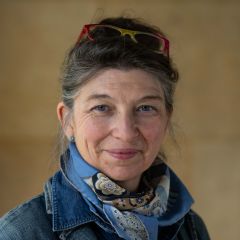Classics
Classics at Cambridge isn’t just studied as a period in the past. We also look at how ancient languages, literatures, art, and thought have affected later ages right up to the present day.

Course overview
Classics is the study of the world of ancient Greece and Rome – the language (ancient Greek and Latin), literature, philosophy, history, and archaeology. Studying this world develops both your skills in close reading and analysis, whether of texts or of material culture, and your creative thinking and problem-solving abilities. The skills required to master this large body of material, and subject it to the rigorous but creative analysis needed to make the most of the incomplete record surviving from antiquity, are highly transferable.
At Cambridge, Classics can be studied in either a four-year or a three year course. It is a four-year course if you have not had the opportunity to study either Ancient Greek or Latin to A Level or equivalent standard. If you have taken either Latin or Greek, or both, to A Level or equivalent standard, then it is a three-year course.
What makes the four-year course different is that it involves intensive language study in both Latin and Greek. The first year of the four-year course is known as the 'Prelim' year: you learn a lot of Latin, a little Greek, and embark on the study of other aspects of Classics (literary study, history, philosophy, art, and archaeology). The first year for three-year students, and second year for four-year students, is called Part IA. Three-year students who have not done Greek before, along with the students who have taken the Prelim year, do intensive study of Greek, and all students cover a wide range of topics in literature, history, philosophy, art and archaeology, and philology and linguistics. The following year (Part IB) sees continued study of the languages along with your choice of other aspects of the course – you can continue to study the full range of Classics, or concentrate in particular areas of literature, history, philosophy, art and archaeology, or philology and linguistics. In the final year (Part II) you study subject areas of your choice in greater depth and can write a dissertation on any Classical topic you choose. You can also take one of a range of papers 'borrowed' from other degree courses.
For more information about the course and its modules, visit the University website.
What is it like to study Classics at King’s?
King’s is an inspirational place to study Classics, and has one of the largest Classics communities in the University (five to ten undergraduates a year). King’s is lucky enough to have specialists in most of the areas of the course who teach you in classes and supervisions. You can expect in your first two or three years to attend 10 to 15 lectures a week in the Classics Faculty plus several Faculty language classes (particularly if you are taking up Latin and/or Greek from scratch). In addition, for your College supervisors, you write an essay a week, undertake weekly language work (translation from Latin or Greek into English), and have a range of classes for which preparation is required.
You benefit from: long and lively meetings of the King’s Classical Society, 24/7 access to a warm and well-stocked College Library, close proximity to the Faculty (only 5 minutes' walk), becoming part of a global community (you will find people who have studied at King’s teaching in Classics departments all over the world), and, most importantly, a distinctive style of teaching and close intellectual relationships with your supervisors. Supervisors start from where you are, and endeavour to uncover with you and for you a world of possibilities you have not previously envisaged.
What do we look for in an applicant to Classics?
At interview, we are looking not for what or how much you know, but for what you can do with what you know. We will seek to explore with you areas that you have studied, and discover what you can do with your knowledge when we set it in a new context or ask you to use it to address a problem or issue you have not faced before. We want to know what you will be like to supervise, so we do our best to interact with you at interview as we will if you are offered a place. Unlikely as it might seem, most candidates really enjoy the interview experience.
Requirements
A Level: A*AA, with A* in Latin or Greek for those applying for the three-year degree
IB: 41-42 points overall with 7, 7, 6 at Higher Level, including Latin and/or Greek for those applying for the three-year degree
Subject requirements: Latin, normally to IB or A Level, for the three-year degree; no specific requirements for the four-year degree
Admissions assessment: Yes. The assessment varies depending on which course you have applied for: for 3 year Classics, Latin (or Greek) skills assessment; for 4 year Classics, language aptitude assessment
Written work: 2 pieces
Written work
We are looking for submitted written work to reveal signs that you are facing up to issues and thinking broadly about them. We are not looking for whether you can hit A Level assessment objectives but whether, faced with an intellectual task, you can see clearly what is at issue and what needs saying. We would prefer your submitted written work to be on a Classical subject.
What is the best thing about studying Classics at King’s?
Realising at the end of the year how much more of the world you understand than you did at the beginning.
A top tip for applicants to Classics at King’s
The point of studying a subject at Cambridge is to challenge oneself intellectually, so expect to be challenged – but also to challenge.
The Directors of Studies for 2025-2026 are Prof. Robin Osborne (Prelim, Part IA, and Part IB) and Dr Rosanna Omitowoju (Part II).





